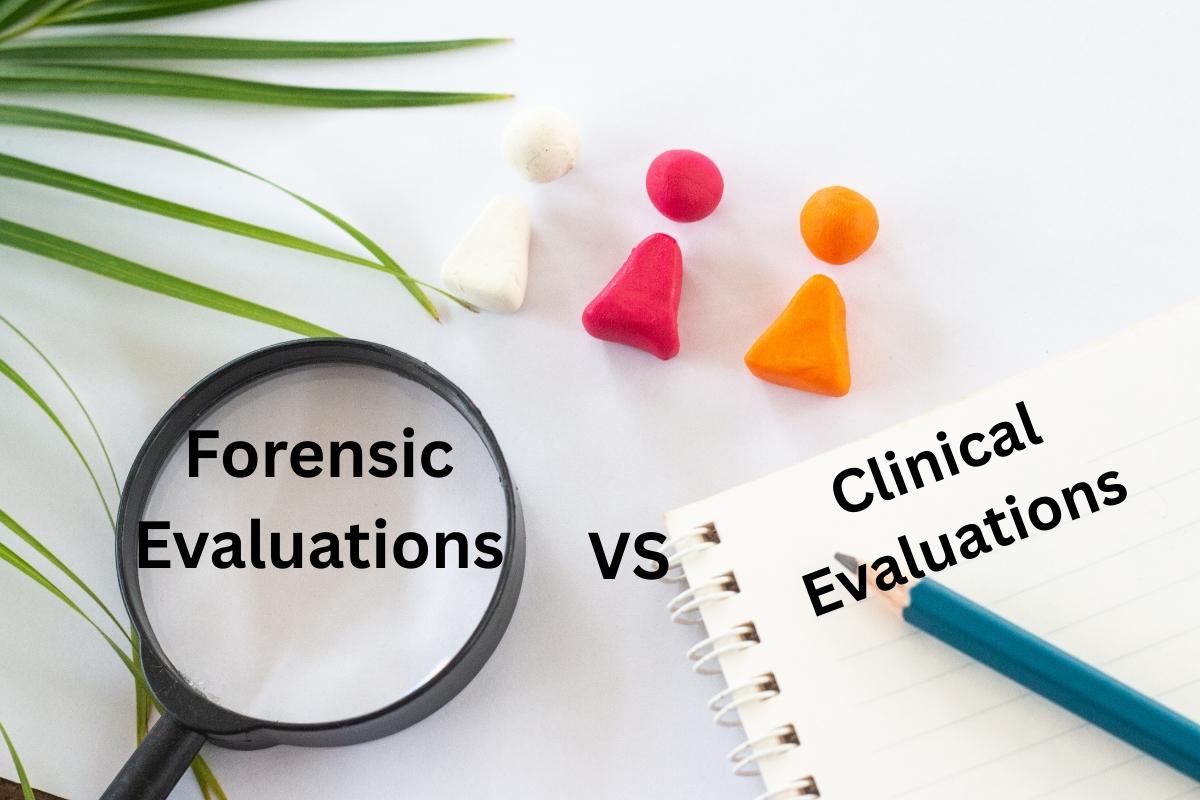How Are Forensic Evaluations Different From Clinical Evaluations?
Forensic evaluations and clinical evaluations serve fundamentally different purposes in mental health assessment. Clinical evaluations focus on diagnosis and treatment planning for patient wellness, while forensic evaluations provide objective mental health information for legal proceedings and administrative decisions. Understanding these distinctions is crucial for both professionals and clients seeking services from forensic and clinical psychology experts.
Key Differences:
- Referral Source: Clinical evaluations come from healthcare providers; forensic evaluations are court-ordered or requested by attorneys/agencies
- Client Relationship: In clinical evaluations, the patient is the client; in forensic evaluations, the court or requesting agency is the client
- Privacy: Clinical evaluations maintain strict confidentiality; forensic evaluations become public records with no privacy protection
- Professional Role: Clinical psychologists advocate for patients; forensic psychologists remain neutral “friends of the court”
- Purpose: Clinical evaluations guide treatment; forensic evaluations answer specific legal questions
Who Needs Which Type: Clinical psychological evaluations help individuals seeking mental health treatment, diagnosis, or therapy planning. Forensic evaluations are required for competency hearings, criminal responsibility determinations, custody decisions, employment screenings, and security clearances.

How Referrals Differ Between Clinical and Forensic Evaluations
Clinical evaluations and forensic evaluations have distinct referral pathways. Each type serves different purposes and involves different decision makers recognized by professional organizations like the American Psychological Association.
For clinical evaluations, patients usually follow their healthcare provider’s guidance. Doctors and therapists recommend these assessments to help diagnose conditions. Patients agree to participate because they want to improve their health. Parents often seek clinical evaluations to understand their child’s developmental needs through services like psychoeducational testing. The primary goal focuses on treatment planning and wellness. These referrals come from trusted medical professionals who know the patient’s history.
Forensic evaluations follow a completely different referral process. Courts and government agencies typically order these assessments for legal proceedings, as recognized by the American Academy of Forensic Psychology. Defense attorneys may request forensic evaluations to support their client’s case. These evaluations help determine competency, criminal responsibility, or custody decisions. Employers sometimes require forensic evaluations before hiring for sensitive positions. Background checks and security clearances often include this assessment type. The referral source holds legal authority rather than medical expertise.
The key difference lies in who initiates the evaluation process. Clinical referrals prioritize the individual’s well-being and treatment needs through therapy services. Forensic referrals serve legal or administrative purposes beyond personal healthcare. Understanding these distinctions helps individuals prepare for their specific evaluation type.
Why Clinical and Forensic Evaluations Matter
Clinical psychologists and forensic psychologists require different specialized training and skills. Not all clinical psychologists can perform forensic evaluations without additional education certified by the American Board of Professional Psychology. Forensic psychologists need strong clinical foundations plus specialized legal knowledge. They must understand both psychology and the justice system thoroughly.
- Clinical evaluations – They help doctors understand patient symptoms and diagnose conditions accurately. These assessments guide treatment planning and monitor patient progress over time. Doctors use specific tools to gather objective information about mental health status, including neuropsychological evaluations when cognitive functioning needs assessment.
- Forensic evaluations – This serves a different purpose in legal settings. Forensic psychologists assess someone’s mental state at specific moments in time. This information helps courts make informed legal decisions about cases. The evaluation focuses on legal questions rather than treatment needs, following guidelines from the American Psychology-Law Society.
The assessment tools differ significantly between clinical and forensic evaluations. Clinical evaluations use instruments designed for diagnosis and treatment planning purposes, including specialized attachment and bonding assessments for family cases. Forensic evaluations require specialized tools that address specific legal standards. These instruments help answer questions relevant to court proceedings effectively. Each type of evaluation demands unique expertise and methodological approaches.
Both evaluation types gather objective information but serve distinct professional purposes. Understanding these differences helps ensure appropriate professional services for each situation. The right evaluation type depends on whether medical or legal needs drive the assessment process.

Understanding Who the Client Is in Clinical and Forensic Evaluations
In clinical evaluations, the definition of the client is usually straightforward. For adult assessments, the individual undergoing the evaluation is the client. When the evaluation involves a child, the parent or legal guardian serves as the client. These clients hold the authority to make decisions about the evaluation process, receive the findings directly, and determine how the results are used or shared. The relationship is built on personal engagement, and confidentiality is maintained between the evaluator and the client unless the client chooses to share the information.
Clinical Evaluation Clients:
- Adults undergoing assessment are their own clients
- Parents or guardians act as clients for minors
- Clients receive the evaluation results directly from the professional
- Clients retain control over the evaluation process and decisions
Forensic evaluations define the client in a very different way. In these situations, the party requesting the evaluation is considered the client, not the individual being evaluated. This requesting party is often a court, attorney, or government agency, as established by the Florida Courts. The evaluated person is the subject of the assessment but does not hold client status. This difference significantly affects how information is shared, the level of confidentiality, and the overall purpose of the evaluation, particularly in cases involving personal or emotional injury evaluations.
Forensic Evaluation Clients:
- Courts, attorneys, or government agencies are designated as clients
- The person being evaluated is not considered the client
- Reports are sent only to the referral source, not directly to the evaluated person
- The requesting party determines how and to whom the information is distributed
The pathways for sharing information differ greatly between these two types of evaluations. In clinical contexts, clients have a personal review of the results with the evaluator, fostering a collaborative and confidential relationship often seen in family therapy settings. In forensic contexts, the results are sent exclusively to the institutional or legal client. The evaluated individual may not have immediate access to the findings and may only review them if granted permission by the requesting party.

Understanding Privacy in Clinical and Forensic Evaluations
Clinical assessments protect patient privacy through strict confidentiality rules. However, forensic evaluations follow completely different privacy standards. Court-ordered forensic evaluations become public records without privacy protections. Many courts, including the Florida Supreme Court, publish forensic evaluation results on their official websites. When employers request forensic evaluations, results go directly to them. This sharing eliminates the confidentiality that clinical patients normally receive. Clients must understand these critical privacy differences before participating.
Clinical and forensic evaluations also differ in professional relationships. During clinical therapy, psychologists actively support and help their patients through approaches like cognitive behavioral therapy. They work as advocates focused on patient well-being and recovery. Forensic evaluations require psychologists to remain completely neutral and objective. They serve as “friends of the court” during forensic evaluations, a standard maintained by the American Board of Forensic Psychology. Their role involves providing accurate information for legal decisions only. This objectivity ensures fair forensic evaluation outcomes for all parties.
Mental health professionals need training in both evaluation types. Understanding clinical and forensic evaluation differences improves professional practice significantly, as regulated by the Florida Board of Psychology. CONCEPT Continuing and Professional Studies offers specialized mental health training. Palo Alto University provides flexible online and in-person program options. These courses cover essential topics for modern mental health practice, including specialized areas like immigration evaluations. Self-paced online learning accommodates busy professional schedules perfectly. Enhance your forensic evaluation expertise by registering for training today.
Conclusion
Understanding the differences between forensic and clinical evaluations is essential for anyone navigating mental health assessments. While both involve professional expertise and objective information gathering, their goals, referral processes, and client relationships diverge sharply. Clinical evaluations aim to diagnose conditions, guide treatment, and prioritize patient wellness. In contrast, forensic evaluations serve legal or administrative needs, often lacking the privacy protections of clinical settings.
Recognizing these distinctions helps individuals prepare for the process, understand who will access their information, and anticipate the evaluator’s role. Whether addressing medical or legal questions, choosing the right type of evaluation ensures that the results are relevant, accurate, and ethically obtained. Professionals trained in both areas bring clarity and precision to their work, ultimately supporting fair treatment, informed decision-making, and effective outcomes in healthcare and judicial contexts. For those navigating complex family situations, services like co-parenting counseling and reunification counseling can provide additional support alongside formal evaluations.
Organizations like the Florida Association of Professional Psychologists and the National Academy of Neuropsychology provide ongoing resources for professionals seeking to maintain the highest standards in both clinical and forensic practice. To learn more about us or to schedule an evaluation, please contact us today.
FAQs
What is the main difference between forensic and clinical evaluations?
Clinical evaluations help diagnose conditions and guide treatment, while forensic evaluations provide mental health information for legal or administrative decisions.
Who is considered the client in a forensic evaluation?
The client is the requesting party, such as a court, attorney, or agency—not the individual being assessed.
Are forensic evaluations confidential?
No. Results are sent to the requesting party and may become public records, unlike confidential clinical evaluations.
Do all psychologists perform both types of evaluations?
No. Forensic evaluations require extra training in legal standards and procedures beyond regular clinical practice.
When would someone need a forensic evaluation instead of a clinical one?
They’re needed for legal matters like competency hearings, custody disputes, or employment screenings for sensitive positions.

